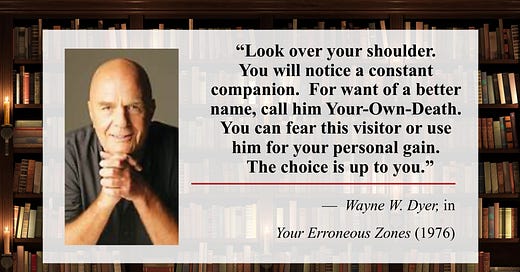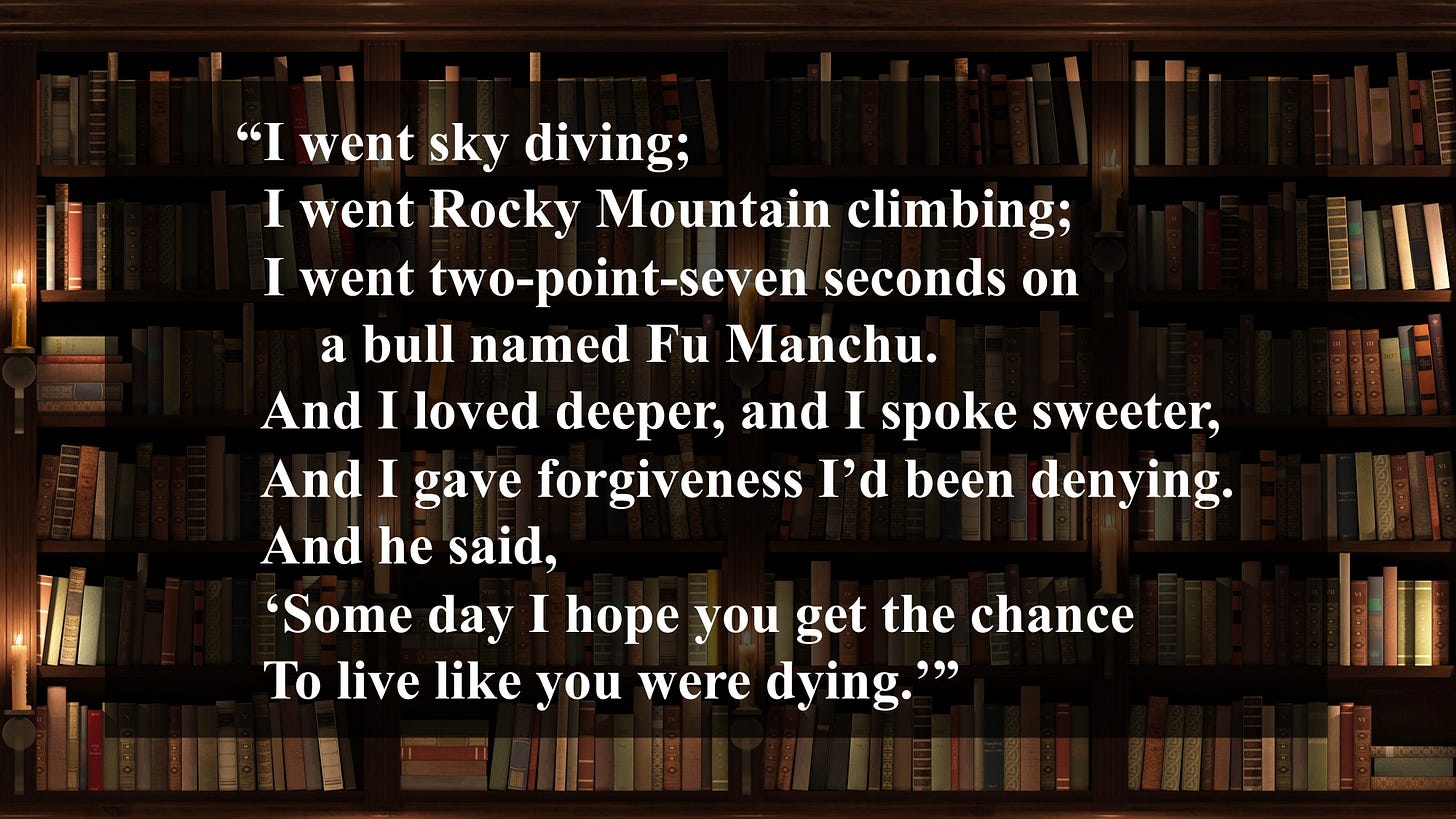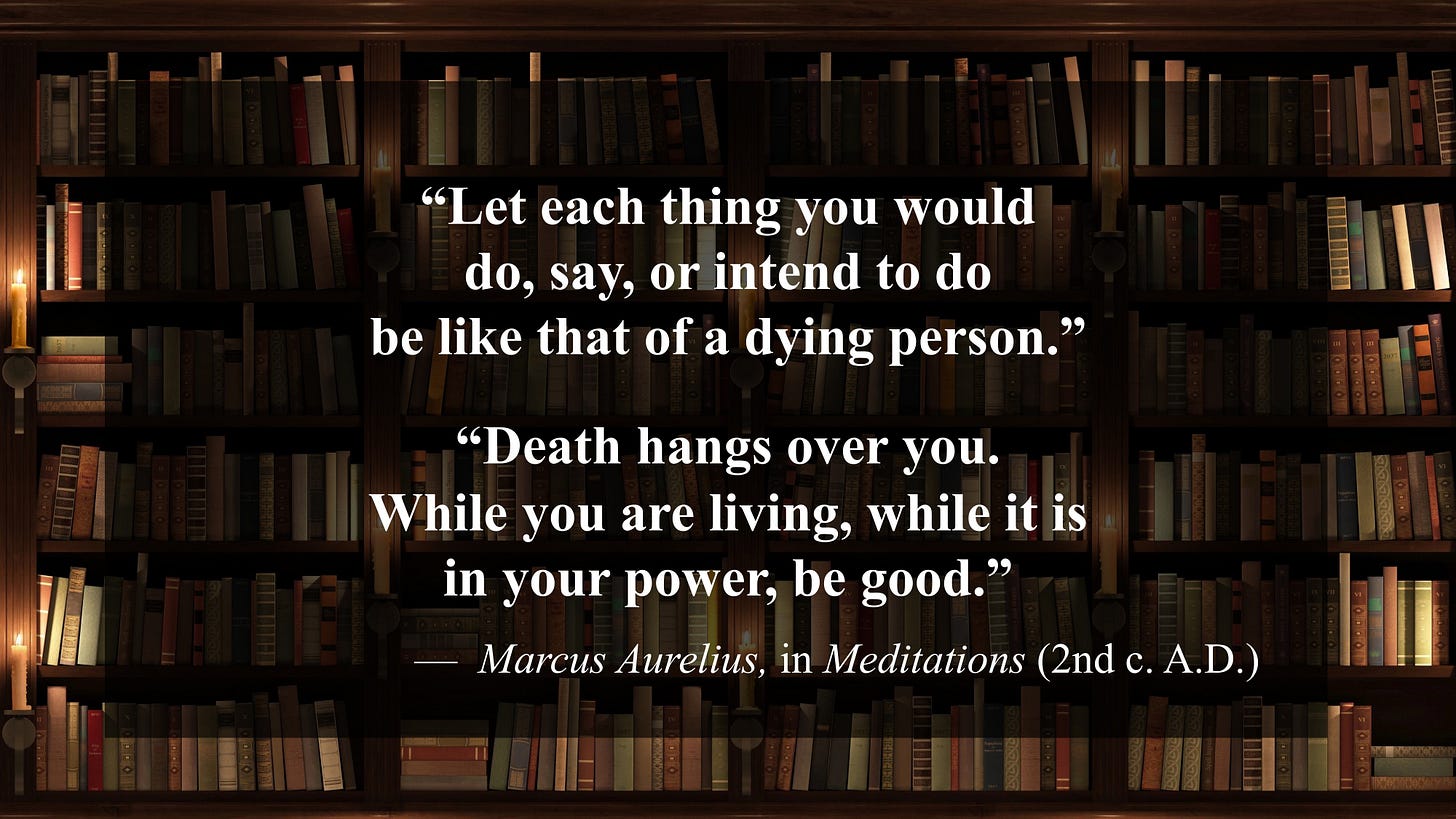Dr. Mardy's Quotes of the Week ("Live Like You Were Dying")
May 4—10, 2025 | THIS WEEK'S THEME: “Live Like You Were Dying”
Opening Line of the Week
In the early 1970s, while working as a professor of psychology at St. John’s University, Dyer’s lectures were so popular with students that a Manhattan literary agent convinced him to put his ideas together in a book. The result was the cleverly-titled and eminently readable self-help book, Your Erroneous Zones (1976).
Initial sales of the book were so sluggish that Dyer decided to take matters into his own hands. He quit his job, loaded the back of his station wagon with books, and embarked on a national promotional tour. After tenaciously pursuing radio stations for interviews and bookstores for book signings, his efforts paid off—handsomely. The book became a word-of-mouth bestseller, and ultimately sold over 30 million copies. That single book built a foundation upon which Dyer forged a spectacularly successful writing career, with well over forty books published before his death at age 75 in 2015.
For nearly 2,000 memorable opening lines from every genre of world literature, go to www.GreatOpeningLines.com.
This Week’s Puzzler
On May 1, 1967, this country & western superstar was born in Delhi, Louisiana (he celebrated his 58th birthday this past week). He was born to Betty Ann D’Agostino, a Jacksonville, Florida teenager who became pregnant after a brief sexual liaison with a pitcher for the Jacksonville Suns, the city’s minor league baseball team. Following a practice common at the time, she was sent to live with out-of-state relatives for the remainder of her pregnancy.
Betty Ann ultimately married a local man named Horace Smith. She and her son both took the Smith name, and the young lad grew up believing his step-father was his dad. At age eleven, though, he accidentally discovered his birth certificate and the identity of his biological father—at the time, a famous relief pitcher for the Philadelphia Phillies.
His mother eventually arranged a meeting between her son and his birth father, but the ballplayer initially denied paternity. A few years later, though, after the physical resemblance between the two became unmistakable, he formally acknowledged the boy as his own. As the years passed, the two men became good friends.
In 1989, the ballplayer’s son moved to Nashville to pursue a career as a country and western singer. He released his first album in 1992, but his first major success came when his 1994 album Not a Moment Too Soon was named Country Album of the Year. Since then, he has released 17 studio albums, most of them reaching Number One on the Billboard charts. In 1996, he married one of country music’s biggest female stars. Today, nearly three decades later, they have three grown daughters and are regarded as one of the entertainment industry’s true “power couples.”
In 2005, he received a Grammy for Best Male Country Vocal Performance for the song “Live Like You Were Dying” (from a 2004 album by the same title). Written by Tim Nichols and Craig Wiseman, the song was inspired by the experiences of people facing life-threatening illnesses, including our Mystery Man’s own father, who was battling an aggressive brain cancer at the time the song was recorded (he died at age 59 in early 2004, about six months before the song was released).
In the song, the narrator recounts a conversation he had with a friend who, after receiving a cancer diagnosis, was told he had only a limited time to live. Rather than descending into despair, the man quickly began to embrace life with a renewed intensity—doing things he’d long dreamed about, deepening his relationships with his loved ones, and becoming “the husband that most of the time I wasn’t.” I’m sure you’ll remember the song’s chorus:
Who is this man? Who was his father? And who is his wife? (Answers below)
Have You Been Living Like You Were Dying?
In his classic treatise Being and Time (1927), the German philosopher Martin Heidegger argued that most people live their lives in a state of being he called “everydayness.” In this mode of existence, they operate on a kind of auto-pilot, so caught up in the routines of living and working that they start taking important things for granted and stop asking such deep questions as What is the purpose of my life? What—and who—do I truly value? What gives my life meaning?
However, when a terminal illness forces people to recognize that their time is limited, they generally begin to appreciate what really matters. As a result, in the final weeks and months of their lives, they may technically be dying, but they’re also living in the fullest sense of the word.
It is against this backdrop that the lyrics in this week’s Puzzler are best understood. The chorus of the song encapsulates one of history’s most important ideas: only when you fully embrace your own mortality will you stop drifting through life and begin to live deliberately and authentically.
When people fully envision the end of their lives, they begin doing things they’ve put off for years. Many also begin treating spouses and family members with more genuine care and concern, or more patience and tenderness. I’ve seen this happen in my own life, and I’ve seen it happen numerous times with my clients: a cancer diagnosis, near-fatal accident, life-altering injury, death of a loved one, or some other crisis stimulates a major life reassessment—and often a dramatic change in behavior.
It’s rare for a 21st century song to reflect a theme from antiquity, but that is the case with “Live Like You Were Dying.” When I heard the song for the first time, I recall wondering how many people would recognize its ancient roots, or the famous Latin saying that emerged to describe it.
Memento mori is a Latin phrase that is most commonly translated as “Remember that you will die” or “Remember that you are mortal.” The saying originated in ancient Rome, when Roman generals, upon returning home from glorious military victories, were followed by a slave who whispered the saying in their ears during triumphal parades. The underlying idea was that a soft reminder of mortality might help prevent the emergence of hubris or vanity.
Over time, the meaning of memento mori was extended to include the idea that people who were aware of their impending death lived more noble or exemplary lives. The idea became an integral part of the philosophy of stoicism, with one of its most famous proponents expressing the idea in a couple of different ways:
The whole matter brings to mind one my all-time favorite quotations:
There are few things that exemplify a crisis more than a cancer diagnosis, a severe heart attack, or a life-threatening car accident, but JFK’s legendary observation reminds us of one of life’s most important lessons—the worst things in life often bring out our best.
And, happily, because of the remarkable powers of the human imagination, we don’t actually need to personally endure a life crisis to experience its benefits. To see what I mean, try the following thought experiment. Imagine that your physician tells you tomorrow that you’ve been diagnosed with a fatal and untreatable disease. You have somewhere between nine and twelve months to live. Go ahead, fix this image in your mind as clearly as you can. It might even help to close your eyes as you begin to imagine how, beginning tomorrow, you will lead your life differently.
Before you attempt the exercise, though, take a few moments to peruse this week’s selection of quotations:
I don't want to get to the end of my life and find that I lived just the length of it. I want to have lived the width of it as well. — Diane Ackerman
It is not dying, but living, that is a preparation for Death. — Margot Asquith
Aging is not just decay, you know. It’s growth. It’s more than the negative that you’re going to die, it’s also the positive that you understand you’re going to die, and that you live a better life because of it. — Mitch Albom
Just as you drifted through an entire day without a plan and accomplished nothing, some people drift through their entire lives. They do it one day at a time, one week at a time, and one month at a time. The months run into years and span a life. It happens so gradually that they are unaware of how their lives are slipping by them until it’s too late. — Mary Kay Ash
Life begins when a person first realizes how soon it ends. — Marcelene Cox
If we accept and internalize the fact of our own mortality, then, by definition, we have to deal with the essential questions of how we live and spend our allotted time. We have to stop procrastinating, pretending that we have forever to do what we want to do and be what we long to be. — Lama Surya Das
Stop acting as if life is a rehearsal. Live this day as if it were your last. The past is over and gone. The future is not guaranteed. — Dr. Wayne Dyer
You cannot avoid mortality. But you can choose your way of meeting it. And that is the most that any man can hope for. — David Gerrold
Knowledge of our own mortality is the greatest gift God ever gives us. — Anna Quindlen
It is only when we truly know and understand that we have a limited time on earth—and that we have no way of knowing when our time is up—that we will then begin to live each day to the fullest, as if it was the only one we had. — Elisabeth Kübler-Ross
For source information on these quotations, and many others on the topic of DEATH & DYING, go here. For quotations on MORTALITY, go here.
Cartoon of the Week
Answer to This Week’s Puzzler:
Tim McGraw, Tug McGraw, and Faith Hill.
For the Official Music Video of “Live Like You Were Dying,” click the link below:
Dr. Mardy’s Observation of the Week:
Thanks for joining me again this week. See you next Sunday morning, when the theme will be “Mothers.”
Mardy Grothe
Websites: www.drmardy.com and www.GreatOpeningLines.com
Regarding My Lifelong Love of Quotations: A Personal Note












I'm assuming many of us remember the movie "The Bucket List"... it's become such a well-known phrase to me, anyway --- getting things onto, & marked off, of one's 'bucket list'. ie: I became certified as a scuba diver at the age of 65 (by far the oldest in my class) & have since seen another part of God's amazing creations - oh, such fabulous critters down there!!!
I hope/pray for people in today's divided world to know that hatred is not how they, personally, want to leave the world.
Good article. I posted my poetic version of my cancer journey today in my newsletter, Wayfarer.